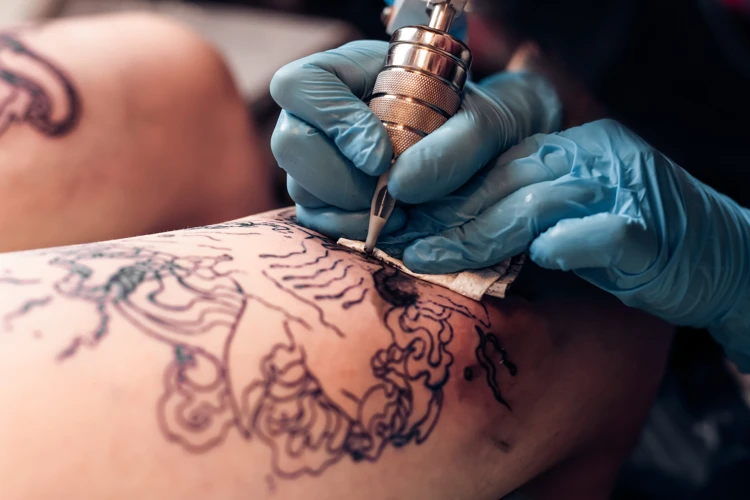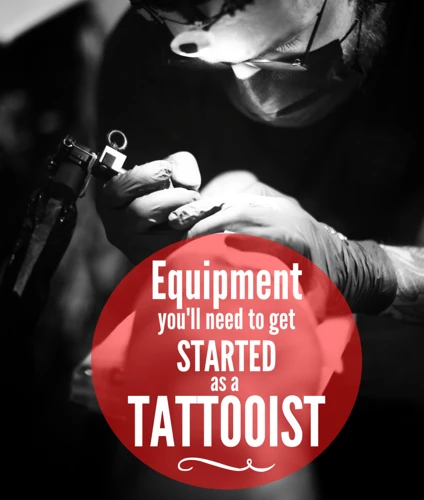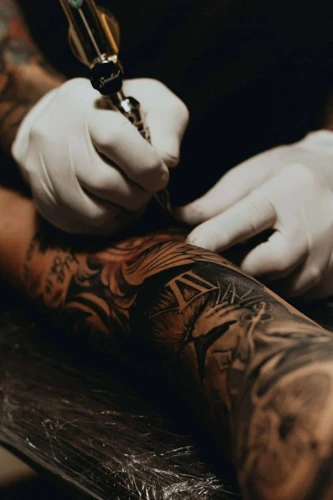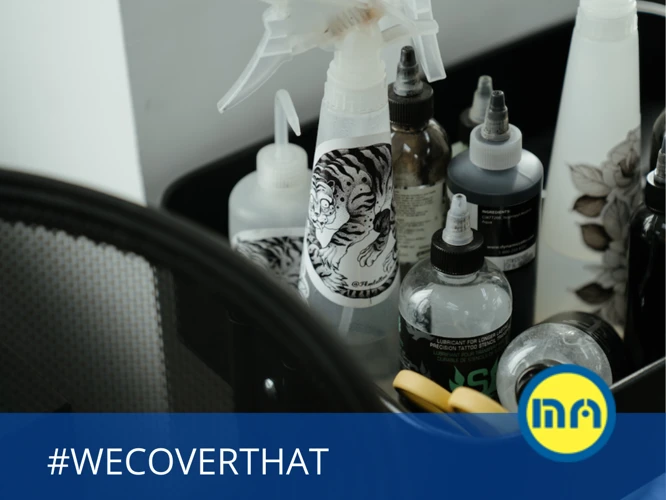If you are considering a career as a tattoo artist, then you are probably wondering “how to be a good tattoo artist?”. Tattooing is an art form that requires creativity, skill, and dedication. In this article, we will provide tips, tricks, and techniques for success as a tattoo artist. From understanding the basics of tattooing to developing your own style, we will cover all the essential elements of being a good tattoo artist. With the right knowledge and practice, you can become successful in this exciting and rewarding profession.
Contents
Qualities of a Good Tattoo Artist

Technical Skills
Tattoo artists must have an in-depth knowledge of the tools and techniques of the trade. They must be able to use a tattoo machine and needles safely and effectively, adjust the machine to achieve the desired depth and intensity of the tattoo, and sterilize their equipment to prevent the spread of infection.
Artistic Aptitude
Tattoo artists must also have an eye for design. They need to be able to work with clients to understand their vision for the tattoo and create a design that is both aesthetically pleasing and reflective of the client’s wishes. Tattoo artists must also be able to create the design on a stencil that can be applied to the skin.
People Skills
Tattoo artists must be able to interact with their clients in a friendly and professional manner. They must be able to put clients at ease and answer any questions they may have about the process and the tattoo itself. Tattoo artists must also be able to listen to the client’s ideas and translate them into a design that the client is happy with.
Physical Endurance
Tattoo artists must be able to stand for long periods of time and have the physical strength to hold the tattoo machine for extended periods. They must also be able to handle the stress of producing a quality tattoo in a timely manner.
Tattoo artists who possess these qualities can be successful in the industry and become a sought-after artist in their community. By honing these qualities and developing their technical, artistic, people, and physical skills, tattoo artists can learn how to become a successful tattoo artist.
Training and Education for Tattoo Artists

Tattooing is an art form that requires skill, dedication, and practice to master. Tattoo artists must have an artistic eye, as well as knowledge of color theory, design principles, and safety protocols to ensure their clients receive the best possible tattoos.
Train with an Experienced Artist The best way to become a good tattoo artist is to learn from an experienced artist. Working alongside an experienced tattoo artist can provide invaluable insight into the industry and provide an opportunity to pick up on tips and tricks. Look for an artist who is willing to teach and mentor, as this can be a great way to learn the fundamentals of the trade.
Take Classes Taking classes in art, design, and safety are all important for becoming a successful tattoo artist. Art classes can help develop an understanding of color theory, design principles, and composition. Taking classes in safety protocols and sterilization processes can help ensure that clients are receiving safe and sanitary tattoos.
Practice on Fruit and Vegetables Practicing on fruit and vegetables is a great way to develop tattooing skills and techniques. This is a great way to learn different techniques and to become comfortable with the equipment and tools. It is important to remember that the skin of a person is not the same as the skin of a fruit or vegetable, so it is important to practice on artificial skin and other materials to gain a better understanding of how to tattoo on real skin.
Research Tattoo Styles Researching different tattoo styles and techniques is essential for becoming a successful tattoo artist. Knowing the various styles and techniques can help an artist create unique and creative tattoos that meet the clients’ needs. Researching the history of tattooing can also provide a better understanding of the industry and help create meaningful and unique designs.
Get Licensed Most states have licensing requirements for tattoo artists. It is important to research the licensing requirements in your area to ensure that you are in compliance with all applicable laws. Licensing can also help to protect both the artist and the client, as it demonstrates that the artist has met the necessary standards and regulations.
By taking the time to learn the fundamentals of tattooing, practicing on fruit and vegetables, researching different tattoo styles, and getting licensed, tattoo artists can become successful and respected in the field. With dedication and practice, anyone can become a great tattoo artist.
Equipment and Supplies for Tattoo Artists

A tattoo artist needs to have the right set of tools and supplies in order to be successful. The most basic and essential supplies include a tattoo machine, needles, inks, gloves, stencils, and a power source.
Tattoo Machine: A tattoo machine is the main tool used for creating tattoos and it is typically made up of a metal frame, coils, a motor, a spring, and a tube. It is important to find a machine that is easy to use and reliable.
Needles: Tattoo needles come in a variety of sizes, shapes, and configurations. The most common needles are round and flat, but there are also magnum needles and curved needles. It is important to make sure that the needles are sterile and safe to use.
Inks: Tattoo inks come in a wide variety of colors and they are used to create the design of the tattoo. It is important to make sure that the inks are safe and of good quality.
Gloves: Gloves are an essential part of the tattoo process as they help to keep the artist and the client safe from any bacteria or germs. It is important to use gloves that are latex-free and disposable.
Stencils: Stencils are used to create the outline of the tattoo and they can be made out of paper, plastic, or metal. It is important to make sure that the stencils are sterile and safe to use.
Power Source: A power source is needed to power the tattoo machine, and it is typically a foot switch or a power cord. It is important to make sure that the power source is safe and reliable.
In addition to these supplies, a tattoo artist will also need a variety of other items such as a workstation, a chair, a first aid kit, and antiseptic ointments. All of these items are essential for a successful tattoo artist.
Building a Client Base

Word of Mouth is the most effective method to building a client base. Utilizing personal networks, engaging with potential clients on social media and offering discounts to existing clients can help spread the word.
Building a Professional Portfolio
Creating a portfolio of art is essential for success as a tattoo artist. Take pictures of tattoos and keep a record of the process, from the initial sketch to the final product. This will help demonstrate the quality of the work and the creative process.
Establishing a Network
Having a strong network of other artists is essential for success. Network with local tattoo artists, art galleries, and other professionals to get advice, find new clients, and build relationships.
Advertising
Advertising is important for any business, and tattoo artists are no exception. Invest in advertising campaigns and create a website to showcase the portfolio. Utilizing social media platforms can also help spread the word and build the brand.
Health and Safety Practices

- Use disposable and sterilized needles – it is essential to use single-use needles and tubes when tattooing, to prevent the spread of any potential infections. Before each tattooing session, the needles, tubes and other materials should be properly sterilized to ensure the safety of the client.
- Wear protective clothing and gloves – to keep yourself and your clients safe, it is important to always wear protective clothing, such as a face mask, gloves, and eye protection. This will help prevent any potential spread of infections.
- Keep your work area clean and sanitized – to provide a safe and hygienic environment for your clients, make sure that your work area is always kept clean and sanitized. This includes disposing of all used needles, tubes, and other materials in a designated medical waste container.
- Inform your clients about aftercare – it is important to inform your clients about the potential risks associated with tattooing, and about proper aftercare. This includes advice on how to keep the tattoo clean and free from infection, as well as how to best protect it from the sun.
Business Practices
Understand Your Target Market: Knowing who your customer base is and what they’re looking for will help you create unique designs that speak to them.
Develop a Professional Brand: Developing a professional brand and logo will help you stand out from the competition and attract more customers.
Stay Up to Date: Continuously learning new tattoo techniques and keeping up with current trends will help you stay ahead of the competition.
Set a Professional Environment: Creating a clean and professional environment is essential for gaining and maintaining customer trust.
Create a Pricing Model: Having a transparent and fair pricing model will help you stay competitive and attract more customers.
Network and Market Yourself: Networking and marketing yourself will help you build relationships and gain visibility in the industry.
Provide a Quality Service: Providing a quality service and building relationships with customers will help you build a loyal customer base.
Frequently Asked Questions
What qualifications do I need to become a successful tattoo artist?
Artistic Ability: Artistic ability and creativity are the most important qualifications for any tattoo artist. A tattoo artist should have a good eye for detail, be able to draw, and have good artistic skills.
Technical Knowledge: A good tattoo artist should possess a good knowledge of the technical aspects of the profession, such as tattooing techniques, equipment maintenance, and safety protocols.
People Skills: A successful tattoo artist should have strong customer service skills, such as the ability to communicate effectively and build relationships with clients.
Business Acumen: A successful tattoo artist should have a good understanding of the business side of the profession, such as marketing, pricing, and maintaining a client base.
Knowledge of Health, Safety, and Sanitation: A tattoo artist should have a good knowledge of health, safety, and sanitation protocols, such as proper sterilization techniques.
Certification: Many states require tattoo artists to be certified in order to practice. Certification requirements vary by state, but typically include training in health and safety protocols, blood-borne pathogens, and infection control.
What Safety Measures Should I Take When Tattooing?
Wear Gloves – Always wear single-use protective gloves when tattooing. Change gloves between clients and when switching between different areas of the skin.
Sanitize Equipment – Disassemble and clean all tools and equipment with an approved disinfectant and autoclave them before each use.
Dispose of Needles – Dispose of needles in a sharps container and replace them with new ones between clients.
Avoid Cross-Contamination – Use a new set of disposable supplies when tattooing each client, and never reuse needles or other supplies.
Maintain Good Hygiene – Wash your hands before and after tattooing, and keep your work area clean and sanitized.
Are There Any Special Techniques I Should Be Aware of When Working With Different Skin Types?
When tattooing different skin types, it is important to be aware of the various techniques that may be necessary to achieve the desired outcome. For example, oily skin may require more frequent wiping and shading to achieve the desired result. Dry skin may require more moisturizing and additional shading to ensure the tattoo looks its best. Additionally, darker skin tones may require more frequent and intense shading to ensure the colors are not too light. It is important to be aware of the skin type of the client before beginning the tattooing process.
What are some of the Best Ways to Market My Tattoo Art?
Social Media: Utilizing social media platforms like Instagram, Facebook, and Twitter can be a great way to promote your work and engage with potential customers. Make sure to post high-quality images of your work, share relevant content, and interact with other tattoo artists and followers.
Word of Mouth: Word of mouth is a powerful marketing tool. Encourage customers to share their experience and recommend your work to friends and family.
Networking: Attend conferences and events related to the tattoo industry and use them as a platform to network with other professionals and potential customers.
Collaborations: Consider collaborating with other artists and businesses to create unique art pieces and promote your work.
Portfolio: Build an online portfolio to showcase your work and make it easy for customers to find and learn about your art.
How Can I Ensure That I’m Providing a Consistently High-Quality Service?
- Stay up to date: Make sure to stay up to date on the latest tattooing techniques and trends. Keep up with the industry and attend seminars, conventions, and other events that will help you to stay sharp.
- Listen to your clients: Pay attention to what your clients want and take the time to listen to their ideas. Ask questions and make sure to get their feedback. It’s important to make sure that you’re delivering exactly what they’re looking for.
- Practice: Make sure to practice regularly to stay in top form. Practice on artificial skin and review your work to make sure that it’s up to your standards.
- Stay organized: Make sure to keep your workspace clean and organized. This will help to ensure that you’re always working in a safe and efficient environment.
- Be honest: If you’re not sure about a design or technique, don’t be afraid to be honest with your client. This will help to ensure that you’re always delivering the best possible results.
Conclusion
To be a successful tattoo artist, it is essential to develop your creative and technical skills, understand your client’s needs, and maintain a safe and hygienic working environment. Dedication and commitment to your craft, along with a positive attitude and continuous learning, will help you to build a successful career as a tattoo artist.